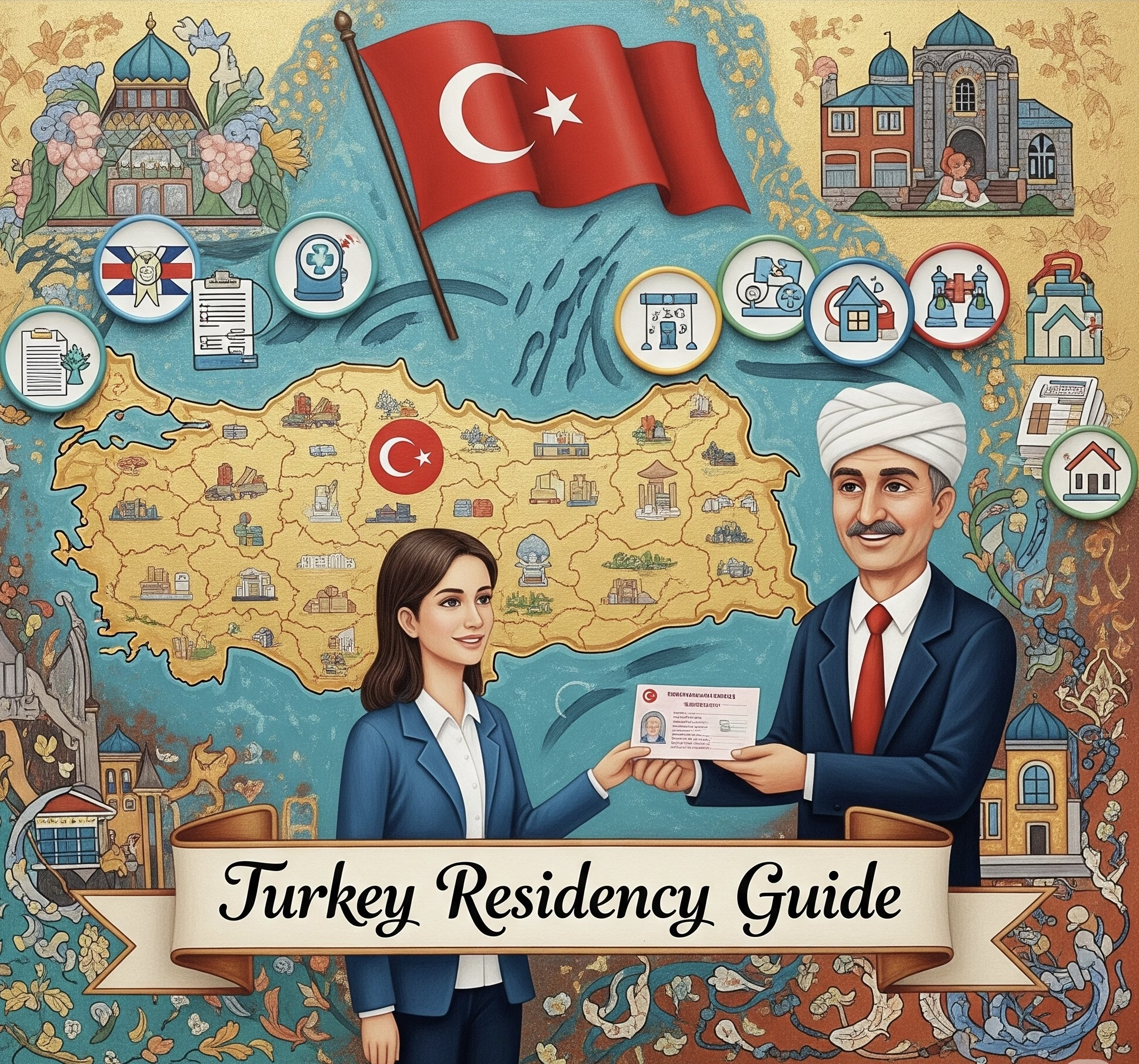
Turkey residency guide
Turkey Residency Guide: Everything You Need to Know
If you’re considering a move to Turkey — whether for retirement, remote work, adventure, or love — you’ll need to understand the residency process.
This comprehensive guide to Turkey residency walks you through the different types of permits, how to apply, what to expect, and how to make the whole process as smooth (and possibly enjoyable) as it can be.
1. Why Get Residency in Turkey?
Thousands of foreigners choose to live in Turkey every year. Whether you want to stay for a few months or settle permanently, having legal residency gives you access to services, stability, and peace of mind.
Benefits of residency in Turkey:
- Legal long-term stay without visa runs
- Easier banking, utility setup, and leasing
- Access to healthcare (SGK or private)
- Ability to buy property
- Enrolling children in local or private schools
- Getting a local driver’s license
- Possible path to long-term residence or even citizenship
In addition, Turkey’s strategic location between Europe and Asia makes it a convenient base for travel, business, and lifestyle — with a lower cost of living than most Western countries.
2. Types of Residency Permits in Turkey
Short-Term Residence Permit (Kısa Dönem İkamet İzni)
This is the most popular option for expats. Typically issued for 1 year, it can be renewed annually. It’s ideal for people renting or owning property, digital nomads, retirees, or those just exploring Turkey long-term.
Requirements may differ slightly depending on the region, but the application process is generally consistent.
Long-Term Residence Permit
If you’ve legally lived in Turkey for 8 consecutive years without interruption and maintained health coverage, you may qualify. This permit offers more security and less bureaucracy.
Advantages:
- Indefinite validity
- Fewer renewal hassles
- Access to more rights similar to Turkish citizens (except voting)
Family Residence Permit
Available to spouses, children (under 18), and dependents of Turkish citizens or foreigners with legal residency. These are valid for up to 2 years.
Documents needed include:
- Marriage certificate or birth certificate
- Health insurance for each applicant
- Proof of income and residence
Student Residence Permit
Issued to foreign students attending university or language programs in Turkey. Note that this permit does not allow legal work, but part-time permissions may be granted in some cases.
Humanitarian Residence Permit
Granted in extraordinary situations — e.g., war refugees, human trafficking victims, or medical emergencies. These are evaluated on a case-by-case basis.
Investor or Business Residency
Foreigners who establish a business in Turkey and meet financial thresholds can qualify. This is often a route to long-term residence or even citizenship through economic contribution.
3. How to Apply for Turkish Residency
Step 1: Online Application (e-İkamet)
Visit the Directorate General of Migration Management (Göç İdaresi) and complete the online form. You’ll schedule a physical appointment (randevu) in your region.
Step 2: Document Checklist
You’ll typically need:
- Valid passport + translated and notarized copy
- Completed application form (printed)
- 4 biometric photos (white background)
- Proof of address (notarized rental contract or tapu/title deed)
- Proof of income (bank statements, pension slip)
- Health insurance valid in Turkey
- Local tax number (Vergi Numarası)
- Proof of paid application and card fees
Additional documents may be requested depending on your city or special circumstances.
Step 3: The Appointment Day
Go to the local Göç İdaresi office on time. Bring originals and copies of all documents. An interpreter is recommended if you don’t speak Turkish.
Step 4: The Waiting Period
You’ll receive a temporary document valid until your official ikamet card arrives by mail, typically within 2–6 weeks.
If anything is missing, immigration may contact you to provide further documentation.
4. Health Insurance for Residency
You must have valid health insurance to apply unless you’re over 65 (exempt). The three main options are:
Private Turkish Insurance
Affordable and widely accepted for residency. Coverage varies — always read the fine print. Good for younger, healthy applicants.
SGK (Sosyal Güvenlik Kurumu)
The public insurance system. You can apply for it after 1 year of continuous legal residence. Premiums are reasonable (~2,000–3,500 TL/month in 2024) and cover most treatments and medications.
International Insurance
Accepted if it meets Turkish policy standards. Often used by global nomads with preexisting coverage. Must include inpatient and outpatient care.
5. Cost of Residency in Turkey
While costs vary slightly by province and applicant age, here’s a realistic breakdown for first-time applicants:
- Application processing fee: ~$30–$80
- Residence card fee: ~$30
- Health insurance: $60–$200 (age-based)
- Notary & translation: $50–$150
- Photos: $10–$20
- Miscellaneous (printing, copies, stamps): $10–$20
Estimated total: $300–$500 per person
Using a consultant or lawyer may add $200–$400 to the total but can simplify the process.
6. Tips for a Smooth Residency Process
- Double-check Göç İdaresi regional office requirements
- Prepare two copies of everything
- Dress neatly and be polite at appointments
- Save all receipts and stamped documents
- Join local expat Facebook groups for up-to-date tips
- Don’t ignore Göç İdaresi emails or SMS alerts
And remember: bring snacks and patience. Bureaucracy in Turkey is an adventure.
7. Renewing Your Residence Permit
Start your renewal application 60 days before expiration — not earlier. You’ll need to:
- Update your application online
- Provide a new proof of income and address
- Submit fresh biometric photos
- Show valid health insurance
If you’ve moved cities, you must reapply at the new location and notify both the old and new provincial directorates.
8. From Residency to Citizenship
Once you’ve lived in Turkey legally for 5+ years (with no more than 180 days abroad per year), you may be eligible for citizenship.
Standard Path:
- 5 years legal stay
- Turkish language skills
- Financial self-sufficiency
- Clean criminal record
Fast-Track via Investment:
- Real estate purchase of $400,000+
- Capital investment of $500,000+
- Turkish bank deposit of $500,000+
The fast-track option typically results in citizenship within 6–12 months.
9. Common Questions About Turkey Residency
Q: Can I apply without a rental contract?
A: No. Proof of address is mandatory. Short-term Airbnb stays are not accepted.
Q: What if I lose my ikamet card?
A: Report it at the local police, then apply for a replacement at Göç İdaresi.
Q: Can I bring my pets?
A: Yes! Turkey is pet-friendly. Just follow the import rules (vaccinations, microchip, paperwork).
Q: Can I open a business with residency?
A: Yes. You can establish a limited company (LTD) or sole proprietorship and register with the tax office.
Q: Will I need a Turkish bank account?
A: Not mandatory, but highly recommended for payments and proving financial stability.
Final Thoughts
Securing residency in Turkey is your gateway to a Mediterranean lifestyle with modern conveniences, vibrant culture, and affordability. Whether you’re retiring, freelancing, studying, or starting over, this guide to Turkey residency is your practical roadmap.
Yes, the process has its paperwork and quirks — but it also leads to sunlit afternoons, bustling bazaars, warm neighbors, and fresh perspectives.
So get your documents ready. Turkey is waiting.
🧾 Key Considerations and Common Pitfalls
Before or during your application, keep in mind:
- Paperwork must be precise – Mistakes in documentation (especially address registration) can delay or reject your application
- Regulations evolve – Immigration laws in Turkey change frequently, so always confirm with up-to-date sources
- Location matters – Certain high-demand areas (like Istanbul, Antalya) may have additional restrictions for foreign residency zones
- Plan renewals in advance – Don’t wait until the last minute; submit renewal applications 60 days before expiry
💬 Testimonials & Real-Life Stories
- “We moved to Alanya for the sea and sun. Five years later, we’ve built a new life, and even learned Turkish. The community is wonderful.” — Michael & Susan, UK
- “My remote job allowed me to live anywhere. Turkey gave me everything — scenery, food, and culture — at a price I could afford.” — Karim, UAE
- “As a retiree, I couldn’t imagine a better mix of comfort and adventure. I live minutes from the beach and pay a third of what I did back home.” — Maria, Germany
🔚
Residency in Turkey isn’t just a bureaucratic status — it’s a gateway to a more affordable, fulfilling, and culturally rich life. It allows you to stay longer, invest wisely, connect deeply, and experience a country that blends East and West like nowhere else.
While the process requires some patience and paperwork, the reward is immense: a home in one of the world’s most beautiful and hospitable countries.
If you’re thinking about making the move — don’t just visit Turkey. Live it.
“Turkey offers retirees the perfect blend of beauty, comfort, and value — low living costs, warm hospitality, and sea views that don’t cost a fortune.”
🌞 Dreaming of warm winters by the Mediterranean?
Thinking about spending your retirement in a sunny, healthy climate?
🏡 Looking to invest in safe, high-potential real estate — and earn solid rental income?
🌍 In today’s uncertain world, having a secure home abroad is more valuable than ever.
At Your Turkey Expert, we work with all major developers across Turkey and offer the widest selection of verified resale apartments and villas — always at the best possible price.
✅ Best Price Guarantee – on every property
✅ No service fee – ever
✅ Full after-sales support – from residence permits to furniture
✅ Honest, expert help – always tailored to your needs
Whether you’re retiring, relocating, or investing — we’re here to guide you every step of the way.
Let us help you find your place in the sun. ☀️
Contact us today – and take the first step toward your new life in Turkey.
🇹🇷 Retire, Invest, or Simply Enjoy Life in Turkey – We’ll Make It Easy
We’ll get back to you quickly — and a solution tailored just for you.

👋 Hi, I’m Urmas Saar. I personally respond to every message and I’ll make sure you get the help or property you’re looking for.
“Looking forward to hearing from you!”
— Urmas, Property Consultant at Expert Turkey
+372 5112 599 (WhatsApp)
